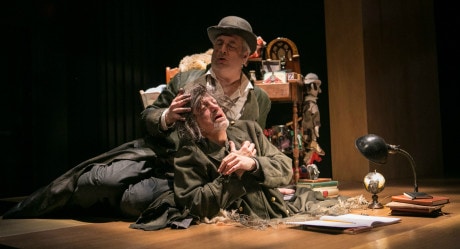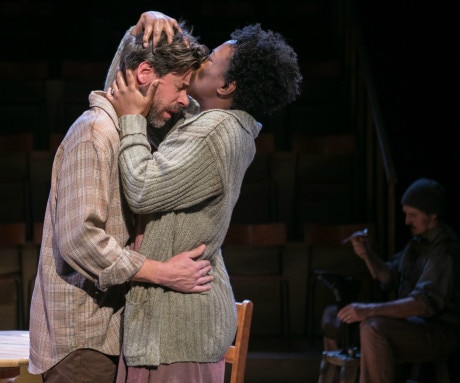Writing a column about Theater J’s world premiere of Falling Out of Time is difficult. Based upon the book by David Grossman, about a man’s 20 year-old soldier son who was killed during military hostilities in the summer of 2006 during the Israel-Lebanon conflict, is like attempting to critique a family sitting Shiva after the death of a child. It feels almost wrong, cheap and unseemly. I wanted to hide rather than think and write. Yesterday morning waking early to become glued to the events in Brussels made the column no easier. Both the production and events in Brussels make this column about trying to live with death that much harder.

But Theater J’s Falling Out of Time, as adapted and directed by Derek Goldman, is a public presentation of a theatrical production meant to be witnessed. My colleagues at DC Theater Arts, Ravelle Brickman and John Stoltenberg have both provided deeply personal reactions to Falling Out of Time. They should be read deeply by anyone who sees Falling Out of Time, who is still trying to react to the production.
For me, the production tries to place a quite personal tomb stone on the grave of a child after years of mourning. I find myself as a witness wanting to comfort; quietly supporting the mourners with all my love. While I could never intimately understand the very personal pain I witnessed, I wanted to be there for the bereaving parents.
I can appreciate why Theater J decided last year to have a theatrical production of Falling Out of Time produced. I could try to understand how this production could be a step toward reconciliation during times of furor, ferment and in its own way the final mourning for a “death” of what once was.
The Theater J production of Falling Out of Time is so very deeply personal. It is gray as ashes and dust that we return to when our time here on Earth is no more. It is a haunting narrative of how one person, then two, and then an entire community of those who lost a child try to endure. It is production that attempts to show us the fine line between sanity and madness. It also a work that shows the fine line between story-telling and dramatic theater performance as it attempts to present the language of the unthinkable.
For me, it was also a work of art as a prayer book coming to life as a way to go through stages of parental grief. The production itself, starts in motion with words spoken by a husband to his wife while sitting at a table eating dinner, “I have to go.” These words are spoken after years of silence about the death of their too young son. Her response is to ask, go where and for what? And that is the journey of the audience too in this Theater J immersive experience.
My colleagues have written eloquently about how they each saw and felt after leaving the production of Falling Out of Time at Theater J. What can I add of value? Let me suggest that anyone who takes in the production brings in their own personal lives. Have they lost a child or nearly lost a child? And grieve or still grieve? Have they faced death during military service? What are they are views of death and how personal faith and rituals help face the final moments of life? Does it truly matter to them that there is a different between a storytelling narrative and a dramatic theatrical presentation.
Falling Out of Time is unique and dark. It may not be for everyone or even for many without a strong connection to its themes. For me, I can understand the need to walk in circles, to bring all the love I have to protect others as I can, to break the silence of unspoken horror.
For me, Falling Out of Time is a near Biblical chant both solo and with a community of mourners. It is internal poetry said in silence while standing. It is not so easily dramatized.
As for the title, here is what I think I heard as spoken by a character at the performance:
“they say of one who dies in war,
he ‘fell.’
And that is you: fallen
out of time,
while the time
in which I abide
passes you by:
The austere, plaintive work of the cast including Nora Achrati, Edward Christian, Leo Erickson, Nanna Ingvarsson, John Lescault, Erika Rose, Michael Russotto, Rafael Untalan, and Joseph Wycoff remined me of a Yom Kippur services. Let me add, that as the bewildered and ultimately forsaken wife, I want to give a spotlight to Erika Rose. She is the witness to all the procedings watching from a higher plane, alive while others find solace only in ashes and dust. The living must go on living.

Falling Out of Time is an intimate, one-of-a-kind experience. What you take away will depend on your own life experiences and values. I must say however, I did not take away what Artistic Director Adam Immerwahr suggested in his program notes about the rights of artists to create their art even if I understood the “why” behind those thoughts. What I took away were connections to all that has happened to me as a parent, as someone who served in the military so long ago and someone who has sat at too many Shivas with others and for myself in my life. That is my take away from Falling Out of Time. If you partake of Falling Out of Time, you will find something different than me, John and Ravelle found, I can be sure.
Running Time: 85 minutes, with no intermission.
Falling Out of Time plays through April 17, 2016 at Theater J – in the Washington District of Columbia Jewish Community Center – 1529 16th Street NW, in Washington DC. For tickets, call the box office at (202) 777-3210, or purchase them online.
LINKS:
Magic Time! ‘Falling Out of Time’ at Theater J in Verse by John Stoltenberg.
‘Falling Out of Time’ at Theater J reviewed by Ravelle Brickman.
In the Moment: ‘Falling Out of Time‘ at Theatre J by David Siegel.





